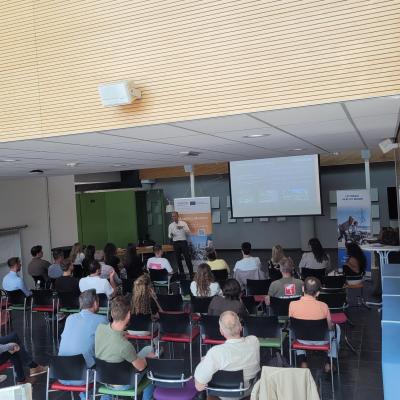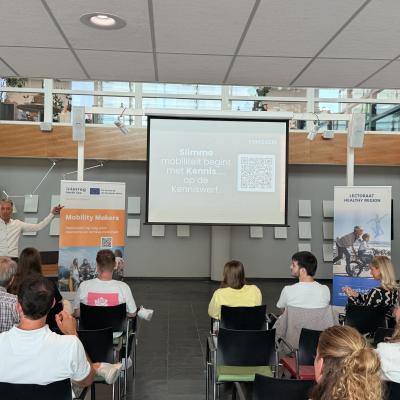On June 23, an inspiring meeting took place in the HZ Tower in Vlissingen, focusing on sustainable mobility and social challenges. The afternoon focused on topics such as making the Kenniswerf more sustainable, the role of students in addressing social issues, and the power of collaboration among education, government, and the business community.
Developments at the Kenniswerf are in full swing. Since November, HZ University of Applied Sciences and the municipality of Vlissingen have been actively involved in the Interreg NSR project Mobility Makers. The Kenniswerf – including the HZ campus – serves as a pilot location for research into stimulating sustainable and active mobility.
Sustainable mobility in practice
Mobility coach Igor Quik from the municipality of Vlissingen took the participants through the concrete plans and actions at the Kenniswerf. He discussed current developments such as electrification, the increasing use of shared (bicycles) and reservable cars, the emergence of the flex network and initiatives such as carpooling and the use of a mobility coach.
Together with students from HZ University of Applied Sciences, research is being conducted into how people currently travel, what their mobility needs are and how behaviour can be influenced. The study also looked at how the redesign of the infrastructure can contribute to a future-proof, sustainable Kenniswerf.
Student research
From business park to lively area
Students from the Vital Society minor then presented their practical research, which is part of the Mobility Makers project. A first group focused on transforming the Kenniswerf from an outdated business park to a lively, sustainable environment.
The focus was on how mobility needs are changing – currently still mainly focused on cars – and how cycling and walking can be encouraged. This proved to be a complex issue with many interests involved, requiring a broad, long-term approach. Students spoke with companies, employees, and fellow students to gain insight into their needs, challenges, and opportunities.
Energy poverty in Middelburg: awareness and solutions
A second group of students investigated the theme of energy poverty in three neighbourhoods in Middelburg: Stromenwijk, 't Zand and Rittenburg. Awareness of this issue was found to be low, while many residents struggle with poorly insulated homes and rising energy costs. Through a stakeholder analysis and various brainstorming sessions with relevant parties – including the municipality, housing association Woongoed, energy suppliers, the Province of Zeeland, and behavioural coaches – a concrete implementation plan was developed to raise awareness and accelerate solutions.
Sugar intake among HZ students: from insight to action
Finally, a third group of students presented their research on sugar intake among HZ students. The figures speak for themselves: young people eat less healthily on average than other age groups. The high consumption of sugary snacks, combined with the unhealthy options available at school locations (such as vending machines and canteens), calls for a behaviour change. Students analysed eating behaviour using the behaviour change model – from precontemplation to behaviour maintenance – and developed a practical implementation proposal to encourage healthier choices, especially during stressful periods such as exam weeks.
Building a vital society together
The afternoon concluded with a networking reception, during which visitors discussed ways to collaborate on building a more vibrant and sustainable society.
Would you like to learn more about Mobility Makers and or one of our studies, or are you interested in collaborating? Please get in touch with the researchers of the Healthy Region research group at HZ University of Applied Sciences, Sybren Slimmen (s.slimmen@hz.nl) and Anne Muilenberg (anne.muilenberg@hz.nl).



